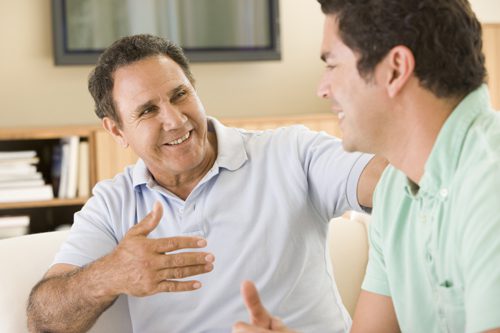The foundation of AA was built on one alcoholic helping another alcoholic.
Twelve-step programs are built upon this principle. People that have completed a drug treatment program will often hear, “go to meetings and find a sponsor.” Finding the right sponsor is an important part of the recovery process. A sponsor helps you through the steps, is there to listen to you, and can be a good friend.
Here are some suggestions on finding the right sponsor for you:
- First and foremost, it is recommended that you find a sponsor of the same gender. The reason for this is that early sobriety (the first year) has a lot of emotional ups and downs. This is why it is suggested that someone newly sober does not get into a new romantic relationship. Your sponsor will be someone that you speak with frequently in order to grow a relationship. This should not be complicated by beginning a relationship with someone of the opposite sex at this vulnerable time.
- A sponsor should have at least two years of continuous sobriety.
- They should have a sponsor of their own.
- They should have worked though all of the steps.
- Their demeanor – Does this person seem happy and content? Are they living an honest life? For instance, if you choose someone who is cheating on their spouse, or living a lie in other ways, do you really want this person to be your sponsor? Your sponsor does not have to be perfect, no one is, but he/she should be living a life as honest as can be. Honesty is the building block of sobriety. You should want what they have. If they are angry and dishonest, is that what you want?
- How many sponsees do they have? If someone agrees to be your sponsor, it is a good idea to ask how many others they are sponsoring. Being a sponsor is a big commitment, and can be time consuming. Your sponsor should have time for you.
- Commitment to the program. Someone who sponsors others should be committed to the program. A big part of this is going to meetings and being in service.
- A sponsor should be a good listener.
- Listen to your intuition. The longer we stay clean and sober, the better we get at listening to ourselves. Take time to listen to yourself and how you feel about this person. A good sponsor/sponsee relationship is built on communication and trust. If you feel as though you do not have a connection with this person, or feel that you cannot trust him/her, then this is not the sponsor for you.
If you choose a sponsor and it is not working out, do not feel as though you are stuck.
A sponsor will understand if you tell them that you do not think it is working out. You may be able to keep this person as a sponsor until you find another. Perhaps they will suggest someone with whom you may be more compatible. This is your life, and your sobriety. Finding a sponsor that is right for you will change your life!
For more information about Twin Lakes Recovery Center’s Intensive Outpatient Program (IOP), please contact us anytime at (770) 282-1272.

